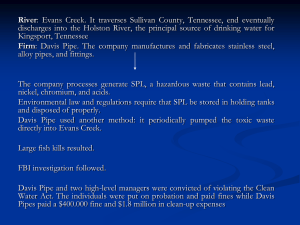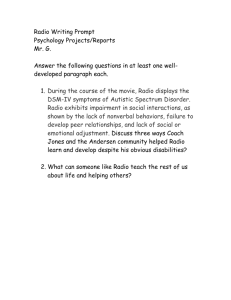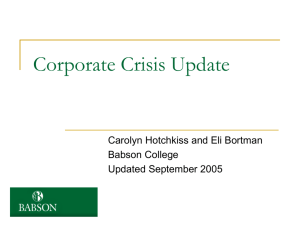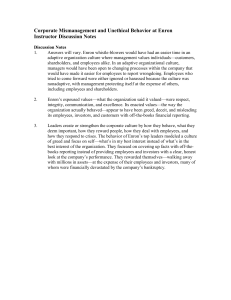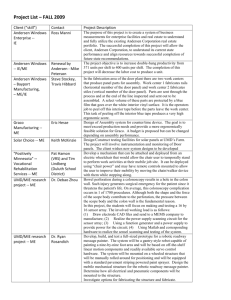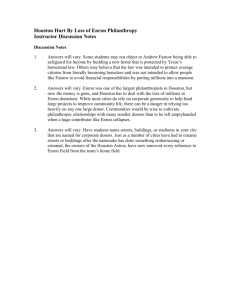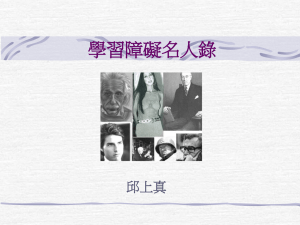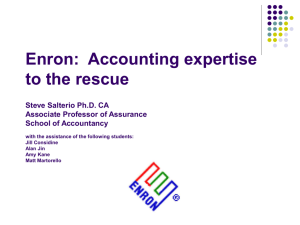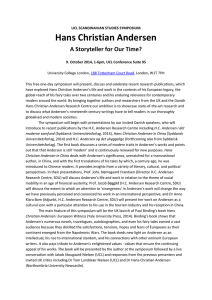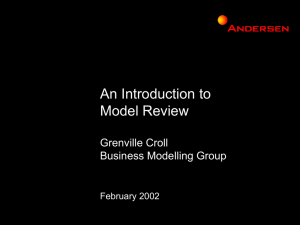Presentazione di PowerPoint
advertisement
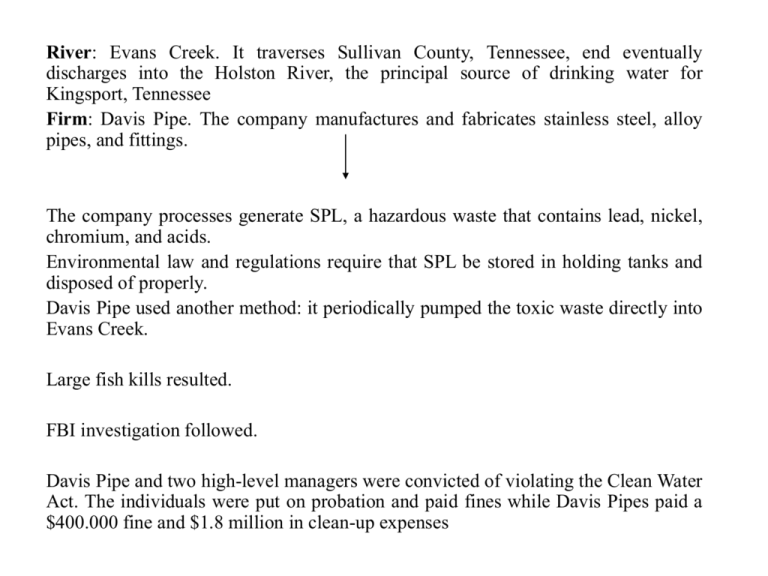
River: Evans Creek. It traverses Sullivan County, Tennessee, end eventually discharges into the Holston River, the principal source of drinking water for Kingsport, Tennessee Firm: Davis Pipe. The company manufactures and fabricates stainless steel, alloy pipes, and fittings. The company processes generate SPL, a hazardous waste that contains lead, nickel, chromium, and acids. Environmental law and regulations require that SPL be stored in holding tanks and disposed of properly. Davis Pipe used another method: it periodically pumped the toxic waste directly into Evans Creek. Large fish kills resulted. FBI investigation followed. Davis Pipe and two high-level managers were convicted of violating the Clean Water Act. The individuals were put on probation and paid fines while Davis Pipes paid a $400.000 fine and $1.8 million in clean-up expenses Firm: Imperial Food Products September 3, 1991: a fire swept through the Imperial Food Products chicken processing plant in Hamlet, North Carolina, trapping and killing twenty-five employees and injuring an additional forty. Unsafe working conditions: •Plant equipment was aged •Maintenance personnel were kept busy repairing the equipment •Plant owners had padlocked exit doors, ostensibly to prevent pilferage of meat by employees Employees were trapped. After the accident, photographs of the interior walls showed bloody hand prints where they tried frantically and desperately to escape. Subsequent investigation showed that nearly all the fatalities resulted from smoke inhalation Safety precautions were minimal to non existent. •The plant did not have automatic shut-off technology, which would have stopped the flow of flammable liquids once the fire began •There was only one fire extinguisher near the chicken fryer, but it was not adequate to control the inferno that developed. •A witness said that locking the exit doors represented the most callous disregard for safety and health, particularly since locked fire exits are so fundamentally to basic common sense safety principles … You don’t need to lock a door from the outside to maintain security. For a few dollars cost, an inside push bar lock would have provided security and safety. For a few dollars cost. We all went through fire drills in our elementary and high schools. Everyone in this room is aware that you don’t block egress through fire exits (U.S. Congress, House of Representatives, 1991:139). •The State of North Carolina fined the company $ 808.150, and the plant’s owner pleaded guilty to involuntary manslaughter. He was sentenced to nearly twenty years’ imprisonment. As part of the plea agreement, charges against his 29 year-old son and the 56 year –old plant manager were dropped (Los Angeles Times) Firm: Arthur Andersen. Founded in 1913, it was one of the largest accounting firms in the world. For decades after its founding, it was also an exemplar of ethical accounting practices and took pride in its reputation as such By the 1960s Andersen created a consulting division that worked with corporate clients to adopt and use computers and other technological developments. Accountants hired to audit a company’s books were also expected to help persuade their clients to use the firm’s consultants as well. Andersen figured in more than one high profile corporate criminal scandal of the 1990s Enron Corporation was one of Andersen’s largest and most profitable clients. David Duncan, the auditor responsible for Enron rapidly became an influential figure at Andersen. When Enron launched the series of fraudolent and criminal debt hiding structures that led to its downfall, Duncan and his employer signed off. When it appeared almost certain that Enron’s transactions would face close and critical external scrutiny, attorney at Andersen recommended that documents pertaining to its dealings with Enron be altered or shredded. Thousands of pages of material related to its dealings with Enron and its accounting work were destroyed. A few months after Enron imploded, disclosures of similar accounting crimes occured at WorldCom, another Andersen client and one of the world’s largest supplier’s of the telephone and wireless services After Enron’s collapse, David Duncan and other executives pleaded guilty to criminal charges and agreed to cooperate with the government in exchange for a light sentence and immunity from prosecution in other cases. On June 15, 2002, Andersen was found guilty in a Houston, Texas, courtroom, of destroying evidence in the Enron case. The firm promptly charged that the verdict was “wrong” and represented only a “technical violation” of law, but in October 2002, Andersen was sentenced to five years’ probation and fined $500.000. In May 2005 the U.S. Supreme Court overturned the conviction. Many of Andersen’s former partners are targets of lawsuits from shareholders left with near-worthless stock. Andersen stopped auditing public companies after 89 years in the business and cut its workforce from 28.000 to 1.000. It was a catastrophic fall for a firm that once was a trusted member of the “Big five” accounting firms with offices throughout the world.
